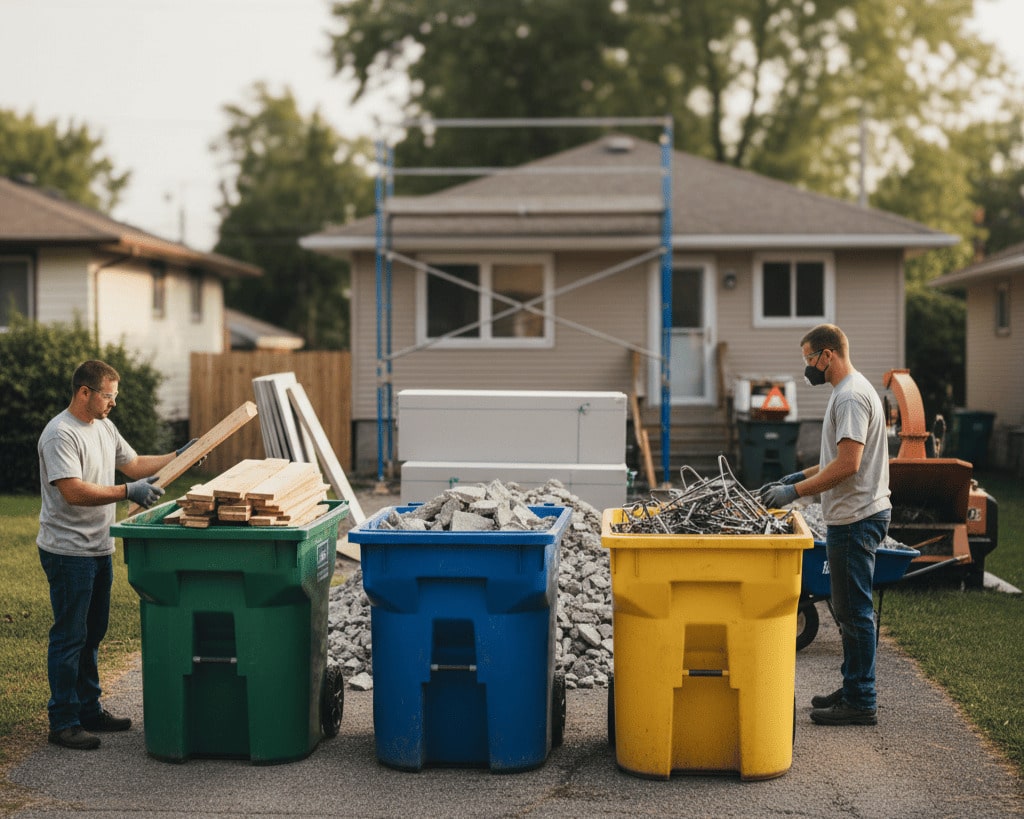If you’re planning a renovation, estate cleanout, or landscaping job in Eastern Winnipeg, finding the right roll-off dumpster in Eastern Winnipeg is one of the first logistics steps that makes the job easier. This guide covers where to look for reliable roll-off services, which local rules and depot options matter, how to prepare your site, what to put in (and out of) the bin, and practical tips that save headaches on delivery day.
I’ll include local references to Winnipeg’s depot network, permit guidance, and national diversion context so you can make an informed choice. I’ll also explain how a local company, such as Mr. Garbage, can simplify delivery, permits, and routing to recyclers so you avoid common surprises.
Where to find a roll-off dumpster in Eastern Winnipeg
Start locally. Search terms like “dumpster roll off near me eastern winnipeg” will return national aggregators and local haulers, but there are a few good shortcuts:
- Local providers with Winnipeg pages know city rules and depot routing. Mr. Garbage lists roll-off options and delivery guidance specifically for Winnipeg.
- Check aggregator listings and local Facebook groups for recent customer feedback; these communities often flag delivery issues and turnaround times.
- Ask contractors working in your neighbourhood; they often have regular hauler relationships and know which companies handle narrow lanes or tricky access.
Choosing local haulers reduces the chance of delivery problems because they already have experience with Winnipeg streets, lanes, and depot routes.
What local depot and recycling rules do you check first
Before you load, understand where different materials should go in Winnipeg.
- Winnipeg’s 4R depots (Brady, Pacific, Panet) handle materials that shouldn’t go into a standard roll-off, electronics, household hazardous products, certain glass types, and other specialty items. Planning a depot run for these items saves time and avoids rejected loads.
- If you have heavy, dense materials (concrete, tile, soil), tell your hauler. Some transfer stations charge by weight and have acceptance rules. Declaring heavy loads ahead of time avoids surprises at drop-off. City of Winnipeg
Using depots appropriately increases diversion, keeping metal, clean wood, and certain plastics out of the landfill stream, and it’s the responsible way to manage problem materials.
Permits, street placement, and Public Works rules
Placement matters. If your dumpster will sit on private property (driveway or private lane), you typically won’t need a City permit. If any part of the container goes on the boulevard, sidewalk, or street, you’ll usually need a Use of Street or similar permit from the City of Winnipeg. Many haulers will arrange permits for you if street placement is unavoidable.
Practical permit tips:
- Ask your hauler whether they arrange street permits as part of the delivery service. A Winnipeg-based provider will often manage the paperwork.
- If you must place the bin on the street, check whether additional traffic-management permissions or deposits are required. The city’s Public Works branch outlines current procedures and contacts. City of Winnipeg
Plan placement early; permit turnaround and traffic conditions can affect your project timeline.
Sizes and truck access to consider
Most haulers offer a range of roll-off sizes. For many homeowners, a mid-sized or 30-yard roll-off is the balance between capacity and driveway fit; for large demolitions or estate clearouts, larger containers may be needed. When ordering, confirm:
- Truck access: Roll-off trucks need room to back or turn. Measure driveway length and width, and check for overhead obstructions like tree branches or eaves.
- Surface protection: if your driveway is soft, new, or made from delicate pavers, ask about plywood or mats to protect the surface during delivery and pickup.
- Placement footprint: measure the drop zone to ensure the container won’t block sidewalks or violate parking rules.
A local hauler can confirm which truck type they’ll use and whether your drop-off spot is suitable. This reduces failed deliveries and extra charges.
What you can (and cannot) put in the bin
Knowing the boundaries keeps the load accepted at the transfer station.
Commonly accepted materials
- Non-hazardous construction and demolition debris: drywall, wood framing, cabinets, flooring, mixed household cleanout items.
- Bulky items such as furniture and mattresses (but consider donation first if items are in good condition).
- Metals, if separated, can often be routed to recycling processors.
Materials that need special handling
- Electronics, batteries, and many household chemicals must go to 4R depots or certified e-waste processors; do not place them in the roll-off. City of Winnipeg
- Appliances with refrigerant require certified recovery before disposal.
- Asbestos, contaminated soils, and other regulated hazardous materials require licensed abatement and disposal; they are not permitted in general roll-off loads.
Declare any unusual or heavy materials when booking so the hauler can advise on routing or special containers.
How to prepare your site for delivery
A little prep makes delivery day easy.
- Clear a straight path: move cars, toys, and debris so the truck has a direct approach.
- Measure and photograph the drop location and approach; send pictures to your hauler, many providers confirm delivery feasibility from photos. Mr. Garbage
- Protect surfaces: lay plywood or timbers if needed to protect lawns or delicate driveways.
- Stage recyclables and hazardous items separately so they don’t end up in the general load.
These steps speed the delivery crew and reduce the risk of damage or failed drop-offs.
Recycling and diversion best practices
Make your roll-off work harder for the environment.
- Separate metals, clean wood, and cardboard before loading. These streams often have higher recycling value and are easier to route to processors.
- Use Winnipeg’s 4R depots for e-waste, paints, batteries, and other problem materials rather than putting them in the bin. Depot staff can point you to the right locations for special streams. City of Winnipeg
- Donate reusable furniture and fixtures when possible; many charities accept good-condition items and will divert them from the waste stream.
Canadian data shows residential sources contribute substantially to diverted waste, so small on-site separation decisions add up. Canada
Common problems and how to avoid them
Avoid these frequent delivery-day headaches:
- Blocked or tight access: clear the approach and verify the turning room.
- Overfilled bins or prohibited items: keep the load below the container lip and remove banned materials before pickup.
- Driveway damage: protect surfaces and ask the driver for the safest placement.
- Missing permits for street placement: confirm in advance whether a permit is required and whether the hauler arranges it. City of Winnipeg
A quick pre-delivery checklist with your hauler prevents most issues.
How Mr. Garbage helps in a roll-off dumpster, Eastern Winnipeg
Local providers reduce friction. Mr. Garbage operates in Winnipeg and offers roll-off and dumpster services with local delivery and permit awareness. They can:
- Advise on bin size and truck access from photos.
- Arrange street permits when placement requires public space. Mr. Garbage
- Route recyclables and special items to 4R depots and partnered processors. Mr. Garbage
Using a local hauler like Mr. Garbage can save time because they already know depot locations, transfer station rules, and the quirks of Winnipeg neighbourhood access.
Real examples from local projects
- Renovation cleanout: Homeowner staged cabinet, drywall, and flooring debris in a 30-yard roll-off and pulled metals for separate recycling trips to the depot; the hauler scheduled a single pickup after the main demo phase.
- Estate clearout: A large bin simplified multi-day sorting and removal; reusable furniture was donated, electronics were taken to a 4R depot, and the remaining items were hauled in one load.
- Landscaping and deck removal: Materials were separated on-site (clean wood vs. treated wood) so the hauler could route streams appropriately.
These practical patterns reflect common Winnipeg projects and show why local planning matters.
Tips for getting the best delivery experience
- Book early and confirm the exact drop spot and delivery window.
- Send approach photos to the hauler and ask about the truck type.
- Ask if the hauler will take your separated recyclables to the right processors.
- Keep a short list of depots (Brady, Pacific, Panet) for special drops and plan those trips ahead of bulky pickups.
Good communication between you, your contractor (if used), and the hauler makes the day go smoothly.
Safety, insurance, and record keeping
- Keep pickup and disposal receipts — they’re useful for insurance claims and for resale disclosures.
- Use licensed technicians for refrigerant removal and asbestos abatement when required.
- Secure loose debris in the bin when windy conditions are forecast to prevent road litter.
Documentation and safe handling protect you and your neighbours.
Conclusion
Finding a roll-off dumpster in Eastern Winnipeg starts with a local search, but it ends with good planning: check depot rules for special materials, confirm truck access and permit needs, separate recyclables, and use a local hauler who knows Winnipeg’s depots and permitting process. Mr. Garbage offers Winnipeg homeowners hands-on support; they confirm site fit from photos, arrange permits when needed, and help route special streams to 4R depots so your project stays compliant and as green as possible.
Ready to schedule a roll-off in eastern Winnipeg? Contact Mr. Garbage for a site check, delivery plan, and depot-routing advice. They’ll match the right bin and handle the logistics so that cleanup is the easiest part of your project.
Frequently Asked Questions (FAQs)
Q1: Where can I find a roll-off dumpster in Eastern Winnipeg?
A1: Start with local haulers that serve Winnipeg; they know neighbourhood access and depot routing. Search for “dumpster roll off near me eastern winnipeg” or contact local providers like Mr. Garbage, who offer site checks and delivery planning.
Q2: Do I need a permit to place a roll-off dumpster on the street in eastern Winnipeg?
A2: Yes, if any part of the bin sits on public property (boulevard, sidewalk, or road), you typically need a Use of Street or similar permit from the City. Ask your hauler whether they arrange permits for street placement.
Q3: What items should not go in a roll-off dumpster?
A3: Don’t put electronics, batteries, household hazardous products, refrigerant-containing appliances (without certified recovery), or asbestos into a general roll-off load — take these items to 4R depots or use licensed contractors for regulated materials.
Q4: How do I prepare my driveway for a roll-off delivery?
A4: Clear a direct path for the truck, measure approach and overhead clearance, protect soft surfaces with plywood if needed, and send photos to your hauler so they can confirm delivery feasibility.
Q5: Can a local hauler help me route recyclables and special items?
A5: Yes. Local haulers like Mr. Garbage can advise which materials should go to 4R depots, take separated recyclables to processors, and arrange staged pickups to match your project timeline.

